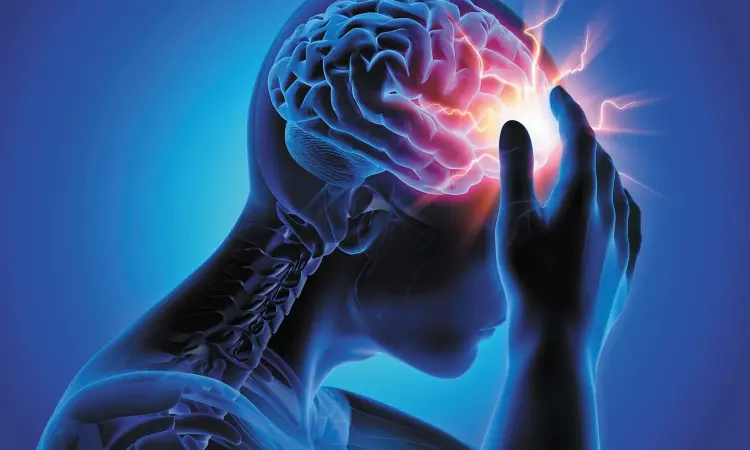- Home
- Medical news & Guidelines
- Anesthesiology
- Cardiology and CTVS
- Critical Care
- Dentistry
- Dermatology
- Diabetes and Endocrinology
- ENT
- Gastroenterology
- Medicine
- Nephrology
- Neurology
- Obstretics-Gynaecology
- Oncology
- Ophthalmology
- Orthopaedics
- Pediatrics-Neonatology
- Psychiatry
- Pulmonology
- Radiology
- Surgery
- Urology
- Laboratory Medicine
- Diet
- Nursing
- Paramedical
- Physiotherapy
- Health news
- Fact Check
- Bone Health Fact Check
- Brain Health Fact Check
- Cancer Related Fact Check
- Child Care Fact Check
- Dental and oral health fact check
- Diabetes and metabolic health fact check
- Diet and Nutrition Fact Check
- Eye and ENT Care Fact Check
- Fitness fact check
- Gut health fact check
- Heart health fact check
- Kidney health fact check
- Medical education fact check
- Men's health fact check
- Respiratory fact check
- Skin and hair care fact check
- Vaccine and Immunization fact check
- Women's health fact check
- AYUSH
- State News
- Andaman and Nicobar Islands
- Andhra Pradesh
- Arunachal Pradesh
- Assam
- Bihar
- Chandigarh
- Chattisgarh
- Dadra and Nagar Haveli
- Daman and Diu
- Delhi
- Goa
- Gujarat
- Haryana
- Himachal Pradesh
- Jammu & Kashmir
- Jharkhand
- Karnataka
- Kerala
- Ladakh
- Lakshadweep
- Madhya Pradesh
- Maharashtra
- Manipur
- Meghalaya
- Mizoram
- Nagaland
- Odisha
- Puducherry
- Punjab
- Rajasthan
- Sikkim
- Tamil Nadu
- Telangana
- Tripura
- Uttar Pradesh
- Uttrakhand
- West Bengal
- Medical Education
- Industry
New Study Suggests Routine Lactate Testing for TBI Patients Could Cut Mortality and Improve Outcomes

Spain: A new study published in Neurology Journal showed that measuring lactate levels in all patients with traumatic brain injury (TBI), especially those with a Glasgow Coma Scale (GCS) score of 9 or higher, offers significant benefits.
Routine inclusion of lactate in TBI screening could lead to earlier and more accurate identification of at-risk patients, potentially reducing both mortality and deterioration rates, Francisco Martin-Rodriguez, Hospital Clínico Universitario, Valladolid, Spain, and colleagues wrote.
Traumatic brain injury remains a leading cause of death and disability worldwide, with rapid and accurate assessment being crucial for effective treatment. Traditionally, lactate levels—a marker of tissue hypoxia and metabolic stress—are measured once patients arrive at the hospital. Dr. Martin-Rodriguez and colleagues aimed to assess how well prehospital lactate levels can predict 2-day in-hospital mortality in patients with traumatic brain injury, the study focused on both severe TBI cases (GCS ≤ 8 points) and mild or moderate TBI cases (GCS ≥ 9 points). Additionally, the research examined the potential of lactate levels to forecast 90-day mortality.
For this purpose, the researchers conducted a prospective, multicenter, ambulance-based cohort study across five tertiary hospitals in Spain, spanning from November 1, 2019, to July 31, 2022. The study involved patients who were transported to referral hospitals for acute traumatic brain injury (TBI) following emergency requests. Exclusion criteria included minors, pregnant individuals, trauma patients without TBI, delayed presentations, patients discharged on-site, those experiencing cardiac arrest, and cases where blood samples could not be obtained.
The primary outcomes examined were all-cause 2-day in-hospital mortality, and 90-day mortality, specifically comparing patients with moderate or mild TBI to those with severe TBI. Clinical and analytical data, including lactate and glucose levels, were systematically collected. To evaluate the effectiveness of prehospital lactate levels in predicting outcomes, the researchers calculated the discriminative power using the area under the receiver operating characteristic curve (AUC) and assessed model accuracy with a calibration curve, across two geographically distinct cohorts.
The following were the key findings of the study:
- The study included 509 patients. The median age was 58 years and 32.8% of patients were females.
- The primary outcome occurred in 2.2% of 415 patients with moderate or mild TBI and 44.7% of 94 patients with severe TBI.
- The predictive capacity of the lactate concentration was globally validated in the cohort, for which the AUC was 0.874 in the validation cohort.
- The ability of the GCS score to predict lactate concentration was greater in patients with a GCS score ≥9 points, with an AUC of 0.925 and a negative predictive value of 99.09 in the validation cohort.
"Our findings showed that routine incorporation of lactate in the screening of TBI patients could presumably reduce mortality and deterioration rates because of better and quicker identification of patients at risk," the researchers concluded.
Reference:
Martin-Rodriguez F, Sanz-Garcia A, Lopez-Izquierdo R, Delgado Benito JF, Martínez Fernández FT, Otero de la Torre S, Del Pozo Vegas C. Prehospital Lactate Levels Obtained in the Ambulance and Prediction of 2-Day In-Hospital Mortality in Patients With Traumatic Brain Injury. Neurology. 2024 Aug 27;103(4):e209692. doi: 10.1212/WNL.0000000000209692. Epub 2024 Aug 1. PMID: 39088773.
Dr Kamal Kant Kohli-MBBS, DTCD- a chest specialist with more than 30 years of practice and a flair for writing clinical articles, Dr Kamal Kant Kohli joined Medical Dialogues as a Chief Editor of Medical News. Besides writing articles, as an editor, he proofreads and verifies all the medical content published on Medical Dialogues including those coming from journals, studies,medical conferences,guidelines etc. Email: drkohli@medicaldialogues.in. Contact no. 011-43720751


